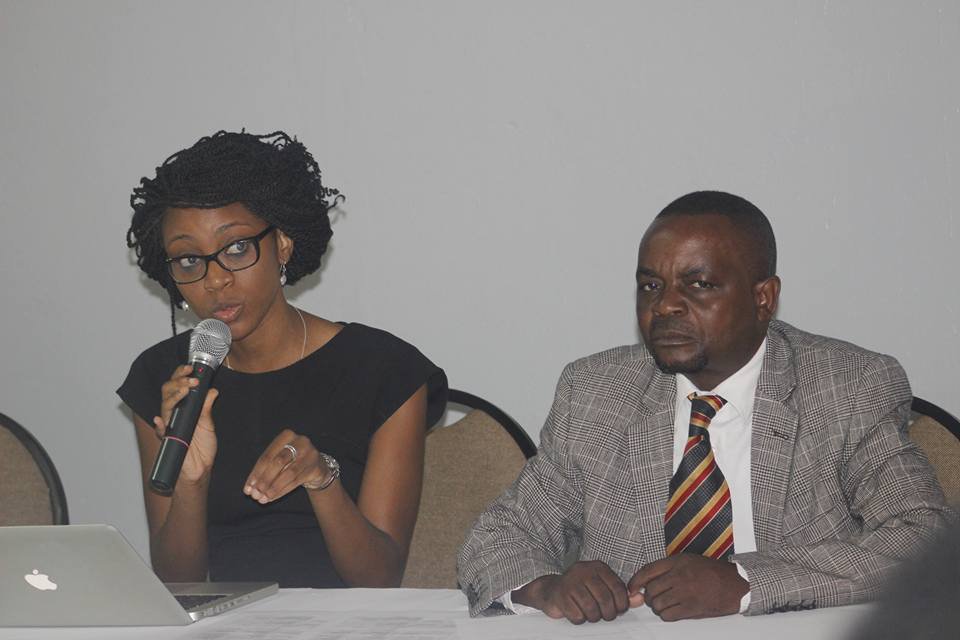EAZ MEDIA BRIEF STATEMENT: ‘2019 Budget Analysis: Is Zambia Ready for Sales Tax?’
Notice: Undefined index: catFilterList in /home/zambi/public_html/wp-content/plugins/wp-likes/api.php on line 243
Article compiled by Kapele Stephen Ndumba
EAZ Programmes Manager
Following the announcement of the 2019 National Budget by the Minister of Finance on 28th September 2018, in which the Minister proposed to replace the Value Added Tax (VAT) with Sales Tax, the Economics Association of Zambia, in collaboration with the British Chamber of Commerce, held a public discussion to debate the likely impact of the proposed Sales Tax on the economy. The discussion was held on 16th October 2018, at Pamodzi Hotel under the theme ‘2019 Budget Analysis: Is Zambia Ready for Sales Tax?’ Over 300 people were in attendance. The panel of speakers included KPMG Partner on tax issues Michael Phiri, International Growth Center Country Economist, Twivwe Siwale, and CUTS International Executive Director, Chenai Mukumba. Zambia Revenue Authority and Ministry of Finance were scheduled to speak, but were unable to attend.
Value Added Tax
Mr. Phiri defined VAT as a consumption-based tax which is levied in the supply chain at each point where value is added to a good or service, adding that VAT was introduced in 1995 to replace sales tax at that time. Mr. Phiri also shared with the participants the various forms in which VAT is administered on goods and services, citing the various rates and exempt scenarios for both domestic and cross-border transactions
Mr. Phiri said VAT has advantages. He outlined some of them as being invoice-based, uniform, uncomplicated, less collection weaknesses, among others. Others include:
- Self-policing, less distortion of trade, and increased tax compliance;
- Promotes strong home manufacturing industry and competitive export prices;
- Input credit mechanism allows tax credit on purchases and taxable expenses;
- Fairer in that it avoids tax on tax characteristics of most general sales tax;
- Wider tax base shared across all sectors of the business community
In spite of the advantages associated with VAT, this tax type is not without flaws. The challenges include:
- Very low domestic VAT compliance levels, especially in the retail sector;
- Slow growth of manufacturing industry following COMESA and SADC protocols;
- Huge VAT refunds arising from zero-rating of exports and negative trade balance;
- Refunds have provided cheap source of financing for Central Government with bizzare rules in place asking for receipts and proof of sale in foreign countries; impact of exchange losses;
- VAT Rule 18 and its unintended consequences;
- Withholding VAT and its impact on local businesses
Sales Tax
Moving on to Sales Tax, Mr. Phiri stated that Sales Tax is a consumption tax levied on goods and services purchased at the retail level, paid by the consumer and submitted by the retailer to the governing tax authority. He added that traditionally, Sales Tax applied only when goods, not services, were sold. He said this, however, has changed and now many service providers need to collect and pay over sales tax.
Shedding light on how this tax will affect businesses and consumers, Mr. Phiri said the imposition of Sales Tax affects the consumer directly on each purchase for non-exempt goods and services. He further stated that businesses will likely not be required to claim input sales tax. He said Sales Tax may increase the cost of doing business for companies that will not be exempted, adding that this is likely going to trigger an increase in the price of commodities and services/inflation, leading to a wage-price inflationary spiral. Like VAT, Mr. Phiri said Sales Tax will not apply to exempt institutions that will be approved.
Mr. Phiri said Sales Tax, like VAT, has advantages. He cited its simplicity for taxpayers e.g. application of rate to the sale value (Ad Valorem Tax) and reduced administration costs for the Revenue Authority.
Mr. Phiri concluded his presentation by giving a comparative analysis of the two tax types, and proposed the way forward. He said whereas Sales Tax is a single point tax, VAT is a multi-point tax charged on value added in the production process. On the need for accounts maintenance, Mr. Phiri said Sales Tax requires less effort because it is simple and easy to calculate. This is in sharp contrast to VAT which requires that proper accounts should be maintained as the tax is comprehensive and complex to calculate. He added that the Sales Tax burden heavily falls on the consumer, unlike VAT where the burden is rationalized. Thus, the burden of tax can be shifted forward in the supply chain to the final consumer and this could be regressive for the majority poor. It would turn Zambia into a sales-oriented economy rather than a producer-oriented economy.
On impact on business, Mr. Phiri cast a dark shadow on Sales Tax. He said Sales Tax is a tax on tax, increases cost of doing business and has a negative effect on manufacturing. On the other hand, VAT is not a tax on tax, and it creates lower costs and encourages manufacturing.
On the way forward, Mr. Phiri said that not all is bad about Sales Tax. He said if proper research is done on the proposed Sales Tax, Zambia could lead the way for other African countries to follow. He said Sales Tax will seal the leakages under the VAT refunds and improve indirect tax contribution in the short term but it will have a negative impact on domestic revenues and growth of the economy in the long term. Mr. Phiri issued a number of cautionary statements which the authorities should consider:
- Challenges of tax systems change during financial year. January 1, 2020 would be ideal;
- Increased cost of doing business across all sectors. This will lead to reduced corporate tax whose impact may not have been considered;
- Sales Tax will address one of the two main challenges with VAT- refunds. However, low tax compliance which is estimated at 16% remains a challenge.
- Recently introduced tax- compliant measures, among them TPIN, CCTV, Fiscal Cash registers, need to be implemented to increase compliance and broaden the tax base.
Giving an international perspective, evidence and lessons from other countries, International Growth Center (IGC) Country Economist Twivwe Siwale said most countries around the globe, including Africa, employ the VAT tax system. In contrast, Sales Tax is only present in small island states, federalist large advanced economies and oil rich Gulf States.
Answering her own question whether Sales Tax will enhance revenue mobilization, Twivwe demonstrated that it will not. She said that in terms of higher revenue mobilization, VAT has a self-enforcing property that leads to higher revenue by creating incentives for business-to-business (B2B) transactions, adding that revenue can be mobilized at each point in the chain while with Sales Tax mobilization is only at the end of the chain which is inequitable to the final consumer. Besides, Sales Tax has a negative Rachet or Domino effect on the welfare of consumers.
Comparing the two tax systems in terms of tax evasion and tax avoidance, the IGC Country Economist demonstrated that VAT is superior to Sales Tax. She said with VAT the information asymmetry between the reporting incentives of suppliers and clients limits room for collusive evasion, adding that VAT gives the Zambia Revenue Authority the ability to crosscheck the values reported by a firm with records from suppliers and clients upon audit. She said with Sales Tax you cannot do an audit as the players are uncountable and it is difficult to identify all of them. In spite of the advantages associated with VAT, both systems suffer a last mile problem, which is that if receipts are not issued to final consumers, then revenue will not be collected. With VAT, only the final payment will be lost; with Sales Tax, that is the only point revenue is collected, and therefore it will all be lost if players are not very large players.
Presenting on how the two systems affect the economy, Ms. Siwale said VAT has higher production efficiency. She said VAT does not distort a firm’s decisions towards imported or domestically-produced goods (In relation to an import duty) whereas Sales Tax distorts a firm’s decisions towards shorter supply chains due to non-deductibility of input tax. On the other hand, Sales Tax leads to price cascading or shifting tax burden forward, due to non-deductibility of input tax.
Ms. Siwale said although Zambia has not done better than its comparators in the region in the administration of VAT, this tax system is superior to Sales Tax. She concluded that VAT is not perfect and there is vast scope for reform but it is the better system for both revenue mobilization and lowering tax evasion, adding that technology used in conjunction with research can play a key role in improving the efficiency of VAT.

CUTS International Director Ms. Chenai Mukumba with Zambia Council for Social Development (ZCSD) Executive Director Lewis Mwape
Giving a Civil Society perspective on the impact of the proposed Sales Tax, CUTS Executive Director, Chenai Mukumba, expressed concern that changing the tax system at a time of fiscal constraint seems a high risk at best. She said if the problem is VAT refunds to the mines, which constitutes 15% of the economy, is changing the tax system the solution? She wondered why we are tearing up something that works for 80% of the economy just to solve one challenge with VAT that could be resolved with some changes to regulation.
It would seem to critical observers that the government is playing Tartuffe with VAT as when it suits them, they can run away from tax refunds with the scrapping of VAT, and at another time, they will introduce Sales Tax to put the shoe on the foot of Consumers, changing it from the Supply foot to the Demand foot. That sounds like policy inconsistency and does not augur well for Zambia as it sends wrong signals to foreign investors.
It is hoped that these views will be looked at as Government reconsiders the reintroduction of Sales Tax.
For further reading, you can access the presentations on http://www.eazonline.net/
Article compiled by Kapele Stephen Ndumba
EAZ Programmes Manager

JCTR Media and Information Officer Tendai Posiana
Tendai Posiana (Miss)
Ecomomics Association of Zambia (EAZ)
Mail: secretariateaz@gmail.com
Address: Plot 11 Mwalule Road, Northmead, Lusaka























